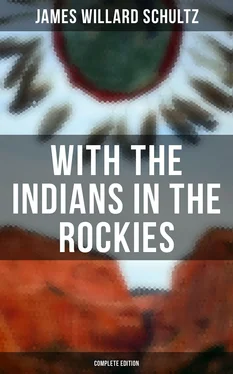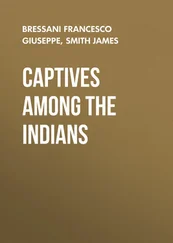"You know how our hearts are set on his going to Princeton," said my father, in his always low, gentle voice, "and then becoming such a preacher as his grandfather was before him. You must help us, Wesley. Show the boy the dark side of the plains life, the hardships and dangers of it."
In our little sitting-room there was a picture of Grandfather Fox, a tall, dark man with a long wig. He wore a long-tailed coat with a tremendous collar, knee-breeches, black stockings, and shoes with enormous buckles. I thought that I should not like to be a preacher if that was the way I must dress. And thinking that, I lost the rest of what they were saying and fell asleep.
Uncle Wesley stayed with us only a few days that spring. He intended to remain a month, but one morning Pierre Chouteau, the head of the great fur company, came to our house and had a long talk with him, with the result that he left for Fort Union the very next day, to take the place of some one who had died there.
So I went back to my studies, and my parents kept me closer at home than ever. I was allowed to go out on real play spells only for two hours on Saturday afternoons. There were very few American boys in the town in those days. Most of my playmates were French Creoles, who spoke very little English, or none at all, so naturally I learned their patois. That knowledge was very useful to me in after days.
I am going to pass over what I have to say now as quickly as possible, for even after all these years, and old as I am, the thought of it still hurts. In February of the following winter my father fell ill of smallpox and died. Then my mother and I took it, and my mother died also.
I did not know anything about her death until many days after she was buried, and then I wanted to die, too. I felt that there was nothing in the world for me, until one day Pierre Chouteau himself came for me in his grand carriage, took me to his house, and kept me there until May, when my uncle arrived again in St. Louis.
Uncle Wesley put on what we call "a bold front" when he came to me, but for all that I could see that he was very sad. We had just one talk about my future. "I should like to carry out your father's and mother's plans for you, Tom," he said. "The only way to do it, so far as I can see, is to send you to Cynthia Mayhew, in Hartford, Connecticut. She loved your mother,—they were just like sisters,—and I know that she would be glad to take care of you and see to your education."
I broke out crying, and said that if he sent me away from him I should die. How could he be so cruel as to send me far away among strangers? And then I cried all the harder, although I was ashamed of myself for doing so.
Uncle Wesley almost broke down himself. He gulped hard two or three times, and his voice wasn't steady as he took me on his lap and felt of my spindling legs and arms.
"Poor boy! You are weak," he said. "Weak in body and low in mind. Well, we'll say no more about this matter of your education now. I'll take you up the river with me for a year, or until you get good and strong. But we'll pack your study books along, and a good part of your mother's library, and you'll have to dig into them every evening after we get settled. Now that's fair, isn't it?"
It was more than fair. My fondest dream was to be realized. I was actually to see the country and the Indians and the great herds of buffalo. There was nothing in St. Louis now to keep my uncle or make his stay there a pleasure. As quickly as possible he disposed of the little shop and its contents, and deposited the entire proceeds with the company for me "for a rainy day," as he said.
On April 10, 1856, we left St. Louis on the Chippewa, a fine new boat that the company had just bought. I was thirteen years old, and that was my first steamboat ride. As the stern-wheel craft swung out from the levee and steamed rapidly—as it seemed to me—up-stream, the novel experience gave me the keenest pleasure. I fairly hugged myself as I remembered that by the channel of the river it was more than two thousand miles to our destination.
We no sooner left the Mississippi and turned into the more muddy waters of the Missouri than I earnestly begged my uncle to get his rifle out of the cabin and load it, so as to be ready to shoot buffalo. I was terribly disappointed when he told me that many days must pass before we should see any of the animals. But to please me he brought the rifle to the cabin deck and fired a couple of shots at the sawyers in the river. Again he loaded the piece, and told me to shoot at one.
"Even boys must know how to shoot where we are going," he said. "Now take a fine sight at the end of that little sawyer and let's see how near it you can place a bullet."
I did as I was told and fired, after a long, wabbly aim; the water splashed just over the tip of the log, and a number of passengers clapped their hands and praised me.
That shot began my training in shooting. Every day after that, until we got to the game country, I spent an hour shooting at different objects in the water and on the banks. One morning I fired at one of a pair of wild geese. The bird gave a flap or two of its great wings, its head dropped, and it floated inertly with the current.
"I killed it!" I shouted. "I killed it! Wasn't that a fine shot, uncle?"
He was silent a moment, and then said gravely:—
"It was a thoughtless boy's shot. And I hope it will be the only one. A true hunter never takes the life of God's creatures needlessly."
That was all he said, but the reproof was enough. I took it to heart, and all my life I have not only profited by it, but preached to others against the wanton taking of life.
After passing St. Charles, Missouri, the ranches of the settlers were farther and farther apart, and in a few days we saw the last of them and were in the wild country. Game now became more and more frequent, especially white-tail deer, of which we soon had some for the table. The boat was always tied to an island or to the shore at sundown, and during the short remainder of daylight we would all scatter in the near timber to hunt. A number of wild turkeys were killed, which made us some fine feasts. On these occasions, however, I was only a follower of the hunters. My red-letter day was yet to come.
At Fort Pierre we saw a great number of Sioux Indians. Formerly a company post, it had been sold to the United States, and was now occupied by several companies of soldiers. Two days after leaving the fort, we sighted the first of the buffalo herds, a small band of bulls that splashed out of the river not far ahead of the boat, and took to the hills. About four o'clock that afternoon, the port engine breaking down, we had to make a long stop for repairs. As soon as we swung into the bank and learned that the boat would be tied there for the night, my uncle got out his rifle, and we went hunting.
The timber bordering the river was half a mile wide, with an undergrowth of willow- and rose-brush so thick that we never could have penetrated it but for the game trails crossing it in every direction. From the looks of them, I thought that thousands of animals must be living there. The trails were worn deep by their sharp hoofs.
In places the earth was moist but hard, and there the tracks were plainly outlined. My uncle pointed out the difference in them—how the tracks of the deer differed from those of elk, and how these differed again from the tracks of the buffalo. I was taught, too, that wolf tracks were longer than those of the mountain-lion, which were nearly circular. Finally, I was asked to prove my knowledge.
"What made those tracks?" I was asked.
I hesitated a moment, and replied that I thought buffalo had made them.
"Right," said my uncle. "They seem very fresh; we will follow them."
The myriad tracks of different game, the mystery of the deep woods, the thought that hostile Indians might be there hunting us, all combined to excite me. My heart thumped rapidly and I found it difficult to breathe. I was afraid, and kept looking intently in all directions—even behind me, for I expected every moment to see something come charging through the brush, either to rend us with sharp claws or to stick our bodies full of arrows.
Читать дальше












